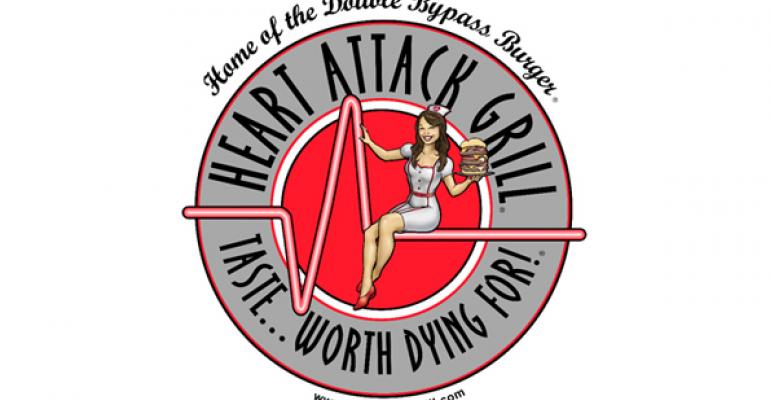Two early February events have definitely turned up the heat on the healthful dining debate. First, anti-obesity crusader The Hudson Institute released a study showing how well restaurants do when offering customers more lower-calorie food and drink options. Then came a real-world tragedy showing an extreme example of what can happen when they don’t—death, by heart attack, of a spokesperson-customer who dined almost daily at over-the-top burger restaurant Heart Attack Grill.
The Hudson Institute report focused on same-store sales and traffic number posted by 21 national chain restaurants in the 2006-2011 period. It correlated those results with the number servings of lower-calorie foods sold by those chains.
Lower-calorie foods were defined as center of the plate or sandwich items of 500 calories or less; beverages as eight-ounce drinks of 50 calories or less; and side dish, appetizer and dessert items of 150 calories or less. Chains included in the study were the eight QSR giants (McDonald’s, et al.); a dozen full-service casual and family dining operations (Applebee’s, Red Lobster, Chili’s, Denny’s, etc.); and fast-casual player Panera Bread.
The outcome:
• Among all chains studied, lower-calorie items were the key growth engine for both foods and beverages.
• Chains growing lower-calorie food servings saw increases in overall food servings, while other chains recorded declines.
• Chains growing lower-calorie food servings also recorded strong traffic growth, while other chains declined.
• The critical same-store sales (SSS) metric was superior among chains growing their lower-calorie servings.
• These chains also saw sharp increases in total chain sales.
The study concluded that “Quick-service and sit-down restaurant chains that grew their lower-calorie servings delivered better business results. In short, sound strategic planning with a commitment to growing lower-calorie items is just good business.”
The big difference maker? Study lead author Hank Cardello told USA Today that sales of signature burgers dropped 28 percent at Burger King, McDonald’s, Sonic and Wendy’s during the study period. Among all restaurants, “Eleven of 12 iconic burgers declined in this period,” he said, “That’s a big deal.”
We remind RH readers that correlation does not equate to causation. Let’s hope it doesn’t for the owner of Heart Attack Grill in Las Vegas, a proudly big-burger-centric restaurant whose motto is “Taste worth dying for.” It’s a clever concept that has had a lot of fun and success with its anti-nutritional-correctness approach to the restaurant business.
But last week saw the restaurant dealing with the very public death by heart attack of John Alleman, a customer who dined so frequently at Heart Attack Grill that a caricature of him graced the front of the restaurant’s menu. The 52-year-old Alleman was the second high-profile “unofficial spokesperson” to die in the past two years. During the same span, one unnamed customer had a heart attack in the dining room and another collapsed last spring while consuming one of the restaurant’s signature “Double Bypass Burgers.” Both survived.
All four incidents made the national news, thanks to the nutrition-be-damned theme the restaurant espouses. But it can’t be good for business. Keep both the Heart Attack Grill’s experience and the findings of the Hudson Institute report in mind as you plan portion sizes and menu offerings for your restaurant going forward. There may be a message here.





